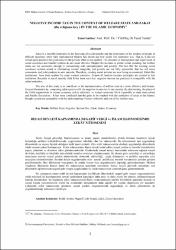| dc.contributor.author | Temür, Yusuf | |
| dc.date.accessioned | 2018-07-12T11:27:40Z | |
| dc.date.available | 2018-07-12T11:27:40Z | |
| dc.date.issued | 2017 | |
| dc.identifier.uri | https://hdl.handle.net/20.500.11776/2694 | |
| dc.description.abstract | Zekât, Sosyal güvenliği finansmanında ve insani yaşam standartlarının altında bulunan insanların içinde bulunduğu şartların iyileştirilmesinde, uygulanması mümkün olan bir müessesidir. Bu müessesenin tam uygulandığı dönemlerde ne derece faydalı olduğuna tarih işaret etmiştir. Zira zekât müessesesinin eksiksiz uygulandığı dönemlerde zekât verecek yoksul kalmamıştır. Zekât müessesesine ikame olarak kabul edilen sosyal yardım ve transfer sistemlerinin yapısı, yönetimi ve denetimi, etkin görünmemektedir. Günümüzde sosyal amaçlı harcamalar artmasına rağmen sosyal devletler, işsizlikle ve fakirlikle mücadelede istenilen seviyeye ulaşılamamıştır. Bu durum gelir eşitsizliği ve yoksulluğu amaçlayan mevcut sosyal yardım sistemlerinin ekonomik etkinsizliği, çoğu iktisatçıları ve politika yapıcıları yeni arayışlara yönlendirmiştir. Bundan dolayı uygulanmakta olan sosyal politikalar, transfer harcamaları yeniden gözden geçirilmektedir. Batı ülkelerinin birçoğunda da zekâta benzer bazı uygulamaların yapıldığı gözlemlenmiştir. Modern vergileme ilkelerinin hemen hepsi bu müessesenin içerisinde mevcuttur. Ayrıca sosyal güvenlik alanındaki son dönemdeki eğilimlerinde negatif gelir vergisi uygulamaları ile zekât müessesinin uyumluluğunu göstermektedir. Bu çalışmanın amacı refah devleti kapsamında özelliklede ülkemizdeki negatif gelir vergisi uygulamalarının zekât müessesi ile karşılaştırarak sosyal yardımların karşılığını daha ucuz ve daha insani bir sisteme yaklaştırılmasına katkıda bulunmaktır. Bu bağlamda zekât müessesesinin İslam ekonomisindeki yerinin belirtilerek günümüz iktisadi ve sosyal hayata yansımalarının tespiti bu alanlardaki tartışmaların daha sağlıklı bir yapıda oluşmasına yol açacaktır. Çalışmada zekât müessesinin günümüz sosyal yardım programlarında uygulandığı ve farklı yöntemlerle de uygulanabileceği neticesine varılmıştır. | en_US |
| dc.description.abstract | Zakat is a possible institution in the financing of social security and the elimination of the troubles of people in difficult situations. when fully implemented History has shown out how useful this institution was. That is, it did not remain poor people to be given zakat in the periods when it was applied. The structure of management and supervision of social assistance and transfer systems do not seem effective. Despite the increase in public social spending, the welfare states are not successful enough in surmounting with unemployment and poverty. The fact that the existing social assistance systems aimed at eliminating income inequality and poverty are not fully successful, that has led many economists and policymakers to new pursuits. Therefore, existing social policies are now being re-examined. Zakat-like institutions have been applied by some western countries. Almost all modern taxation principles are existed in this institution. Recently in social security field It has been seen that negative income tax practices is compatible with the zakat institution. The aim of this study is to contribute to the implementation of welfare state in a more effective and humanfocused dimension by comparing zakat system with the negative income tax in our country. By determining the place of the Zekât organization in islamic economy and its reflection in today's economic life it is possible to make more robust and fruitful discussions. It has been concluded that the goals to be reached with the institution of zakat in the Islamic thought system are compatible with the understanding of social solidarity and aim of the welfare state. | en_US |
| dc.language.iso | tur | en_US |
| dc.publisher | Namık Kemal Üniversitesi | en_US |
| dc.rights | info:eu-repo/semantics/openAccess | en_US |
| dc.subject | Welfare State, | en_US |
| dc.subject | Negative İncome Tax, Zakat, | en_US |
| dc.subject | Islamıc Economy | en_US |
| dc.subject | Refah Devleti, Negatif Gelir Vergisi, Zekât, İslam Ekonomisi | en_US |
| dc.title | Refah devleti kapsaminda negatif vergi ve islam ekonomisinde zekât müessesesi | en_US |
| dc.title.alternative | NEGATIVE INCOME TAX IN THE CONTEXT OF WELFARE STATE AND ZAKAT (the religious levy ) IN THE ISLAMIC ECONOMY | en_US |
| dc.type | article | en_US |
| dc.relation.ispartof | Balkan Sosyal Bilimler Dergisi | en_US |
| dc.department | Tekirdağ Namık Kemal Üniversitesi Dergileri | en_US |
| dc.authorid | 17360 | en_US |
| dc.identifier.volume | 6 | en_US |
| dc.identifier.issue | 12 | en_US |
| dc.identifier.startpage | 1 | en_US |
| dc.identifier.endpage | 11 | en_US |
| dc.relation.publicationcategory | Makale - Ulusal Hakemli Dergi - Başka Kurum Yazarı | en_US |



















